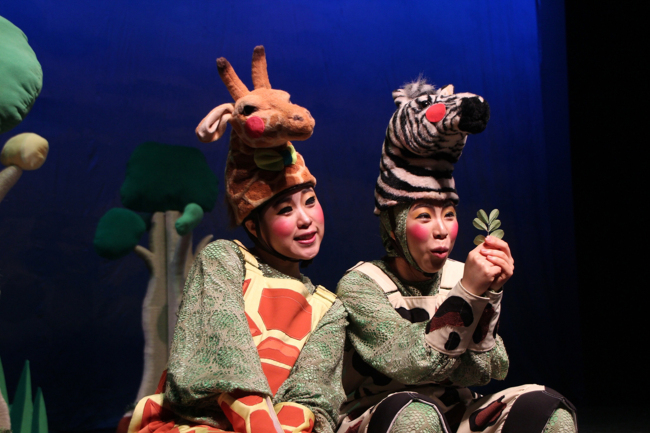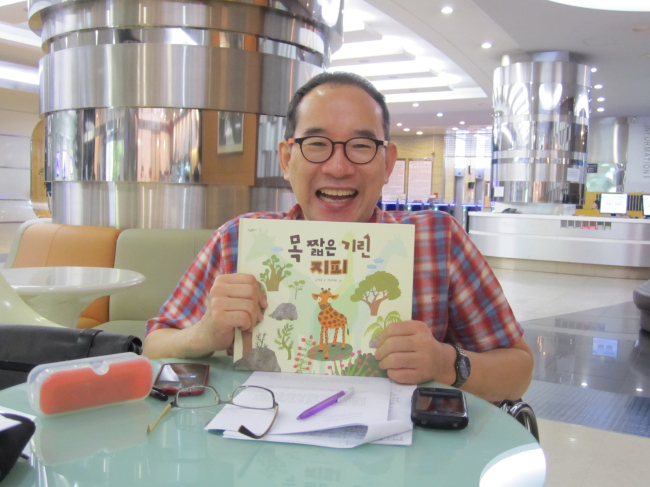Children’s musical rethinks disabilities
Ko Jung-wook’s works regularly recommended for children, young adults
By Korea HeraldPublished : Aug. 3, 2014 - 20:52
Giraffes capture the imagination as majestic creatures towering over the African savannah with elongated necks suitable for reaching high branches. But what would life be like for a giraffe born with a short neck? Were such an anomaly to exist in nature, a rough guess based on the notion “the survival of the fittest” would be that it would face many kinds of adversity, all pointing to an early exit from nature’s stage.
An inspiring story premised on the same thought experiment questions this grim prediction in an upbeat children’s musical that will grace select theaters this summer. “Giffy, the Short-Necked Giraffe” opened in 2012 and has enjoyed a steady run of performances ever since. Earlier this year, the musical won the grand prize at the Seoul Children’s Theater Awards for its catchy lyrics, endearing costumes and energetic cast.
An inspiring story premised on the same thought experiment questions this grim prediction in an upbeat children’s musical that will grace select theaters this summer. “Giffy, the Short-Necked Giraffe” opened in 2012 and has enjoyed a steady run of performances ever since. Earlier this year, the musical won the grand prize at the Seoul Children’s Theater Awards for its catchy lyrics, endearing costumes and energetic cast.

What holds the musical together is an award-winning script by Ko Jung-wook, who recently sat down with The Korea Herald to discuss the inspiration behind “Giffy.” Known primarily as an author of children’s literature, Ko has led a productive and illustrious career, writing over 300 books and selling more than 3 million copies. His works regularly appear on recommended reading lists for children and young adults in Korea. Approximately 30 have been translated into foreign languages.
A thread running through many of Ko’s stories is the issue of disability. In his critically acclaimed novella “A Very Special Brother” Ko traces the relationship between a young boy and his older brother who is afflicted with cerebral palsy. Ko returned to disability-related problems in his subsequent works, many of which are informed by his own struggle with physical impairment.
“When I was in elementary school, I had a classmate who carried my backpack for me,” said Ko, whose legs were incapacitated just shy of his first birthday due to polio. “He carried my backpack for one year, rain or snow. It was quite an extraordinary thing for him to do.”

This childhood experience provided the inspiration for another of Ko’s hits. According to Ko, the short story “The Boy who Carried the Backpack” marked a transition from his earlier works, which explored individuals with different kinds of physical impairment, to books examining friends of disabled people.
“The shift in focus was the result of my realization that a disability is not a problem for disabled people alone,” Ko said. “A friend must often shoulder the burdens of someone who is physically or mentally impaired. The community of which such a person is a part may also experience difficulties.”
In “Giffy, the Short-Necked Giraffe,” one of his more recent works, Ko attempts to present the subject of disabilities to younger children in an approachable way. The plot revolves around a vertically challenged giraffe called Giffy, a shortened version of “giraffe” according to Ko, who wanted to capture the character’s defining feature in its name. Initially, Giffy appears as a downtrodden youth belittled by other giraffes because of its deformity. Over the course of the musical, the outcast turns into a hero by turning a disadvantage into an asset.
“To appeal to younger children, I decided to use animals as characters just like many fables,” said Ko, who counts Nikos Kazantzakis as a main literary influence. “The story deals with the question of how a short-necked giraffe might survive in a world where this is abnormal. In other words, it is analogous to the problems disabled people face in a society where the majority are not.”
“Giffy” stands out in Ko’s oeuvre for its unique genesis. Upon the request of the musical company Hanure, Ko conceived a story about a short-necked giraffe and wrote a script, his first foray into the genre. Only later did Koh publish a storybook version as an offshoot.
Ko had kept his eyes on theater since his time at Sungkyunkwan University, where he earned his doctorate in Korean literature. Attending performances in nearby Hyehwa-dong, Seoul’s theater district, had been a favorite pastime. With “Giffy,” Ko said his dream of seeing his work performed on stage has been realized. The author has adapted three of his fictional books for the stage recently, expanding his budding career as a playwright.
In writing the musical “Giffy,” Ko said he wished “to change the viewer’s perception of disabilities for the better and to combat discrimination and prejudice against disabled people.”
It is natural to assume Ko wishes to tackle pejorative connotations and common misunderstandings about people with physical or mental impairments. While this is certainly a part of Ko’s reason for writing the musical, Ko intends to address a broader set of issues.
“Giffy’s short neck immediately catches viewers’ attention with its physical aspect,” Ko said. “But many people see themselves in Giffy: the multicultural family, the physically impaired, the foreigner and the outsider standing on the margins of mainstream society. Everyone is hurt and experiences the pain of being unable to participate in some way, so I think ‘Giffy’ can be viewed from multiple angles.”
Also including the unemployed, victims of bullying and the elderly among the “disabled,” Ko noted how the official discourse on disabilities has evolved over the years. According to Ko, the concept of disabilities, which was initially equated with problems in body function, was later expanded to cover difficulties in executing activities and obstacles to participation in society. The World Health Organization includes all three areas ― impairments, limitations in activities and restrictions to participation ― in its conceptualization of disability today.
The specifics regarding how to interpret and apply these terms are up for debate, but the question Ko invites one to consider is general: How do the problems facing those we recognize as “people with disability” in fact relate to our own? And how might Ko, an author who uses a wheelchair, be speaking to a shared interest in living an able life in his works?
Then there is the deeply personal side to the musical, which is not only a mirror in which viewers may see their own problems, but also a window into the life of a particular individual who has wrestled with what it means to be disabled throughout his life.
“My life philosophy is contained in the musical. There is one scene where the mother giraffe tells Giffy that every living being is born into this world endowed with a purpose. This is also my story,” Ko said.
Perhaps what is most surprising about Ko given his success is that writing as a profession was not his childhood dream. His hopes of becoming a doctor were dashed when medical schools at the time rejected his applications on the grounds that he was physically impaired. Taking the path of a writer, Ko said, was a kind of accident.
But, reflecting further, Ko explained how he came to realize that educating people about disabilities was his “calling.” Ko realized that his disability, which he pointed out was something he needed to “accept” but, strictly speaking, could never “overcome,” had given him a unique vantage point from which to fulfill his purpose, just as Giffy’s short neck plays a key part in saving the animal kingdom from the menacing poacher in the musical.
“When I was young, I used to agonize over why I was fated to be a cripple. I would think how I would be perfect if only I could walk. But later I realized the world needed at least one smart, well-read, and hard-working disabled person who could communicate to the rest of the world the hardship and pain that people with disabilities experience in their lives,” Ko said, exuding an inner strength that was palpable throughout the interview.
Writing books has been an important tool in this mission, along with giving public lectures about his life and works, counseling students with disability issues, and donating royalties from his books. Ko, a father of three, is also famous for replying to emails from his young readers.
And now, in his new capacity as a playwright, Ko has acquired another means with which to transmit Giffy’s two-sided lesson: the first about respecting other people’s differences and the second about accepting rather than being subdued by one’s disabilities.
“My dear friends, the world is a place where people of great differences rub shoulders with each other,” Ko says via the narrator of the musical to a group of kindergarten students toward the end of one performance. “I hope you, too, will be friends with kids around you who resemble Giffy.”
The children’s musical “Giffy, the Short-Necked Giraffe” runs through Aug. 24 at Garden 5 Art Hall. Tickets cost 25,000 won. For more information, call (02) 336-3767.
By Moon Young-hoon (ymoon@heraldcorp.com)
-
Articles by Korea Herald







![[Graphic News] More Koreans say they plan long-distance trips this year](http://res.heraldm.com/phpwas/restmb_idxmake.php?idx=644&simg=/content/image/2024/04/17/20240417050828_0.gif&u=)
![[KH Explains] Hyundai's full hybrid edge to pay off amid slow transition to pure EVs](http://res.heraldm.com/phpwas/restmb_idxmake.php?idx=644&simg=/content/image/2024/04/18/20240418050645_0.jpg&u=20240419100350)






![[From the Scene] Monks, Buddhists hail return of remains of Buddhas](http://res.heraldm.com/phpwas/restmb_idxmake.php?idx=652&simg=/content/image/2024/04/19/20240419050617_0.jpg&u=20240419175937)

![[KH Explains] Hyundai's full hybrid edge to pay off amid slow transition to pure EVs](http://res.heraldm.com/phpwas/restmb_idxmake.php?idx=652&simg=/content/image/2024/04/18/20240418050645_0.jpg&u=20240419100350)

![[Today’s K-pop] Illit drops debut single remix](http://res.heraldm.com/phpwas/restmb_idxmake.php?idx=642&simg=/content/image/2024/04/19/20240419050612_0.jpg&u=)